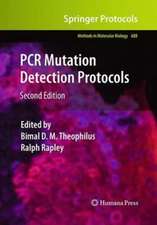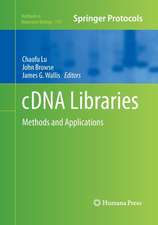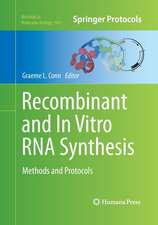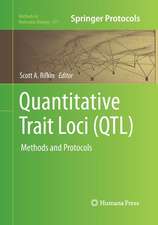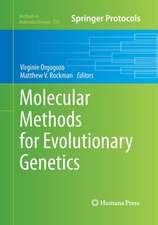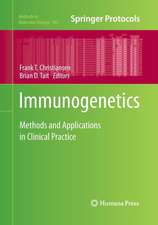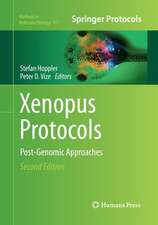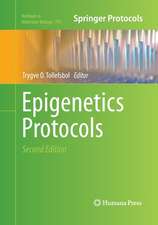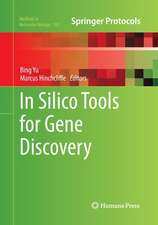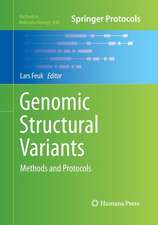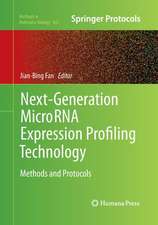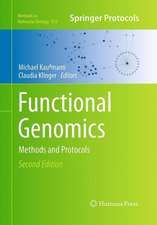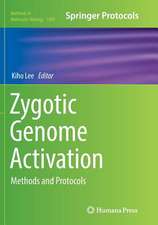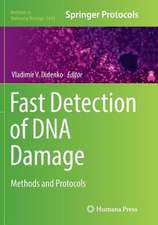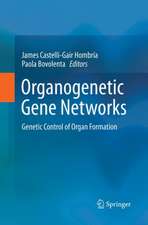Gene Function Analysis: Methods in Molecular Biology, cartea 1101
Editat de Michael F. Ochsen Limba Engleză Paperback – 24 aug 2016
Authoritative and easily accessible, Gene Function Analysis, Second Edition seeks to serve both professionals and novices with a growing understanding of the complexity of gene function.
| Toate formatele și edițiile | Preț | Express |
|---|---|---|
| Paperback (2) | 791.97 lei 43-57 zile | |
| Humana Press Inc. – 24 aug 2016 | 791.97 lei 43-57 zile | |
| Humana Press Inc. – 19 noi 2010 | 942.90 lei 43-57 zile | |
| Hardback (2) | 952.57 lei 43-57 zile | |
| Humana Press Inc. – 23 aug 2007 | 952.57 lei 43-57 zile | |
| Humana Press Inc. – 14 noi 2013 | 1116.21 lei 43-57 zile |
Din seria Methods in Molecular Biology
- 9%
 Preț: 791.63 lei
Preț: 791.63 lei - 23%
 Preț: 598.58 lei
Preț: 598.58 lei - 20%
 Preț: 882.98 lei
Preț: 882.98 lei -
 Preț: 252.05 lei
Preț: 252.05 lei - 5%
 Preț: 802.70 lei
Preț: 802.70 lei - 5%
 Preț: 729.61 lei
Preț: 729.61 lei - 5%
 Preț: 731.43 lei
Preț: 731.43 lei - 5%
 Preț: 741.30 lei
Preț: 741.30 lei - 5%
 Preț: 747.16 lei
Preț: 747.16 lei - 15%
 Preț: 663.45 lei
Preț: 663.45 lei - 18%
 Preț: 1025.34 lei
Preț: 1025.34 lei - 5%
 Preț: 734.57 lei
Preț: 734.57 lei - 18%
 Preț: 914.20 lei
Preț: 914.20 lei - 15%
 Preț: 664.61 lei
Preț: 664.61 lei - 15%
 Preț: 654.12 lei
Preț: 654.12 lei - 18%
 Preț: 1414.74 lei
Preț: 1414.74 lei - 5%
 Preț: 742.60 lei
Preț: 742.60 lei - 20%
 Preț: 821.65 lei
Preț: 821.65 lei - 18%
 Preț: 972.30 lei
Preț: 972.30 lei - 15%
 Preț: 660.49 lei
Preț: 660.49 lei - 5%
 Preț: 738.41 lei
Preț: 738.41 lei - 18%
 Preț: 984.92 lei
Preț: 984.92 lei - 5%
 Preț: 733.29 lei
Preț: 733.29 lei -
 Preț: 392.60 lei
Preț: 392.60 lei - 5%
 Preț: 746.26 lei
Preț: 746.26 lei - 18%
 Preț: 962.66 lei
Preț: 962.66 lei - 23%
 Preț: 860.22 lei
Preț: 860.22 lei - 15%
 Preț: 652.64 lei
Preț: 652.64 lei - 5%
 Preț: 1055.50 lei
Preț: 1055.50 lei - 23%
 Preț: 883.87 lei
Preț: 883.87 lei - 19%
 Preț: 491.89 lei
Preț: 491.89 lei - 5%
 Preț: 1038.86 lei
Preț: 1038.86 lei - 5%
 Preț: 524.16 lei
Preț: 524.16 lei - 18%
 Preț: 2122.34 lei
Preț: 2122.34 lei - 5%
 Preț: 1299.23 lei
Preț: 1299.23 lei - 5%
 Preț: 1339.12 lei
Preț: 1339.12 lei - 18%
 Preț: 1390.26 lei
Preț: 1390.26 lei - 18%
 Preț: 1395.63 lei
Preț: 1395.63 lei - 18%
 Preț: 1129.65 lei
Preț: 1129.65 lei - 18%
 Preț: 1408.26 lei
Preț: 1408.26 lei - 18%
 Preț: 1124.92 lei
Preț: 1124.92 lei - 18%
 Preț: 966.27 lei
Preț: 966.27 lei - 5%
 Preț: 1299.99 lei
Preț: 1299.99 lei - 5%
 Preț: 1108.51 lei
Preț: 1108.51 lei - 5%
 Preț: 983.76 lei
Preț: 983.76 lei - 5%
 Preț: 728.16 lei
Preț: 728.16 lei - 18%
 Preț: 1118.62 lei
Preț: 1118.62 lei - 18%
 Preț: 955.25 lei
Preț: 955.25 lei - 5%
 Preț: 1035.62 lei
Preț: 1035.62 lei - 18%
 Preț: 1400.35 lei
Preț: 1400.35 lei
Preț: 791.97 lei
Preț vechi: 833.66 lei
-5% Nou
Puncte Express: 1188
Preț estimativ în valută:
151.56€ • 157.65$ • 125.12£
151.56€ • 157.65$ • 125.12£
Carte tipărită la comandă
Livrare economică 14-28 aprilie
Preluare comenzi: 021 569.72.76
Specificații
ISBN-13: 9781493960637
ISBN-10: 1493960636
Pagini: 429
Ilustrații: XIII, 416 p. 123 illus., 86 illus. in color.
Dimensiuni: 178 x 254 mm
Greutate: 0.74 kg
Ediția:Softcover reprint of the original 2nd ed. 2014
Editura: Humana Press Inc.
Colecția Humana
Seria Methods in Molecular Biology
Locul publicării:Totowa, NJ, United States
ISBN-10: 1493960636
Pagini: 429
Ilustrații: XIII, 416 p. 123 illus., 86 illus. in color.
Dimensiuni: 178 x 254 mm
Greutate: 0.74 kg
Ediția:Softcover reprint of the original 2nd ed. 2014
Editura: Humana Press Inc.
Colecția Humana
Seria Methods in Molecular Biology
Locul publicării:Totowa, NJ, United States
Cuprins
The Present State and Future Direction of Integrated Gene Function Analysis.- Performing Integrative Functional Genomics Analysis in GeneWeaver.org.- Functional Annotation of Differentially Regulated Geneset Using WebGestalt: A Geneset Predictive of Response to Ipilimumab in Tumor Biopsies.- Integrative Data-Mining Tools to Link Fene and Function.- Detection of Driver Protein Complexes in Breast Cancer Metastasis by Large Scale Transcriptome-Interactome Integration.- Pattern Identification in Time Course Gene Expression Data with the CoGAPS Matrix Factorization.- Statistical Tools and R Software for Cancer Driver Probabilities.- Predicting the Functional Consequences of Somatic Missense Mutations Found in Tumors.- Determining the Effect of DNA Methylation on Gene Expression in Cancer Cells.- Reverse Engineering Transcriptional Gene Network.- Integrating In Silico Resources to Map a Signaling Network.- A Method for Inducible Gene Over-Expression and Down-Regulation in Emerging Model Species Using Pogostick.- Construction and Application of Site-specific Artificial Nucleases for Targeted Gene Editing.- Selection of Recombinant Antibodies from Antibody Gene Libraries.- Construction of Simple and Efficient siRNA Validation Systems for Screening and Identification of Effective RNAi-Targeted Sequences from Mammalian Genes.- Rapid Genetic Modification of Mouse Embryonic Stem Cells by Inducible Cassette Exchange Recombination.- In Ovo Electroporation of miRNA-Based Plasmids to Investigate Gene Functionin the Developing Neural Tube.- Proteomic Strategies: SILAC and 2D-DIGE - Powerful Tool to Investigate Cellular Alterations.- Conditional Gene-Trap Mutagenesis in Zebrafish.
Textul de pe ultima copertă
The determination of protein function has been a major goal of molecular biology since the founding of the discipline. However, as we learn more about gene function, we discover that the context within which a gene is expressed controls the specific function of that gene. It has become critical to establish the background in which gene function is determined and to perform experiments in multiple applicable backgrounds. In Gene Function Analysis, Second Edition, a number of computational and experimental techniques are presented for identifying not only the function of an individual gene, but also the partners that work with that gene. The theme of data integration runs strongly through the computational techniques, with many focusing on gathering data from different sources and different biomolecular types. Experimental techniques have evolved to determine function in specific tissues and at specific times during development. Written in the successful Methods in Molecular Biology series format, chapters include introductions to their respective topics, lists of the necessary materials and reagents, step-by-step, readily reproducible protocols, and notes on troubleshooting and avoiding known pitfalls.
Authoritative and easily accessible, Gene Function Analysis, Second Edition seeks to serve both professionals and novices with a growing understanding of the complexity of gene function.
Authoritative and easily accessible, Gene Function Analysis, Second Edition seeks to serve both professionals and novices with a growing understanding of the complexity of gene function.
Caracteristici
Includes cutting-edge methods and protocols Provides step-by-step detail essential for reproducible results Contains key notes and implementation advice from the experts
Recenzii
From the reviews:
"‘Gene Function Analysis’ is volume 408 of the ‘Methods in Molecular Biology’ series. The aim of the book is to provide both in silico and laboratory methods for the functional analysis of the large amount of gene expression data generated from high throughput technologies such as microarrays. … This book would certainly be a useful addition to a laboratory interested in assessing gene function through both bioinformatic and ‘wet’ approaches. Definitely one for the more (toxico)genomically challenged amongst us." (James Sidaway, British Toxicology Society Newsletter, Summer, 2008)
"‘Gene Function Analysis’ is volume 408 of the ‘Methods in Molecular Biology’ series. The aim of the book is to provide both in silico and laboratory methods for the functional analysis of the large amount of gene expression data generated from high throughput technologies such as microarrays. … This book would certainly be a useful addition to a laboratory interested in assessing gene function through both bioinformatic and ‘wet’ approaches. Definitely one for the more (toxico)genomically challenged amongst us." (James Sidaway, British Toxicology Society Newsletter, Summer, 2008)






